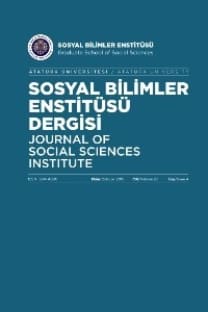Öğrencilerin Dil Öğretimi ve Öğrenimi ile İlgili Algıları ve Beklenen Yenilikler
Moda bir terim olan 'yenilik' kısa bir zaman önce ortaya çıktı. En geniş anlamıyla 'yenilik' yeni fikirleri endüstri, eğitim, havacılık vb. gibi neredeyse bütün alanlara uygulamaktır. Teknoloji ve internet hızlı bir şekilde gelişmekte ve insanların yaşamlarını değiştirmektedir. Bu değişimler yaşamlarının her aşamasında onlara yenilikler sunmaktadır. Örneğin, 'sosyal ağ' olgusu kısa bir zaman önce ortaya çıkmasına rağmen günümüzde internet kullanıcılarının büyük bir çoğunluğu sosyal ağı kullanmaktadır. İnternet ve teknolojinin gelişimi dil öğretimini ve öğrenimini insanlar için kolaylaştırmıştır. Bununla birlikte, "e-öğrenme " terimi eğitimin teknolojik cihazlar yoluyla internet üzerinde gerçekleşmesini açıklamak için bulunmuştur. Teknoloji ve internet dünyasındaki değişimler kaçınılmaz olarak alışılmış Dil Öğretim ve Öğrenimini değiştirmiş ve doğal olarak dil öğrenim ve öğretimini kolaylaştırmıştır. Bu başlıca nitel çalışma öğrencilerin dil öğretim ve öğrenimi ile ilgili mevcut ve yakın gelecekteki olası yenilikler hakkındaki algılarını bulup ortaya çıkarmayı amaçlamıştır
Learners' Perceptions on Innovations in Language Teaching and Learning and Expected Ones
The very buzzword 'innovation' has just come up recently. With its broadestmeaning, 'innovation' is a kind of implementation of new ideas in almost all areas such asindustry, education, aviation, banking and so on. The technology and the Internet are growingvery rapidly, and have continued to change people'slives. These changes have provided manyinnovations in almost every aspects of people's lives. For instance, although the phenomenon'social networking' exploded recently, most of the Internet users around the world use socialnetworking nowadays. The development of technology and the Internet has made LanguageTeaching and Learning easier for people. Having said that, the term "e-learning " is coinedto explain language teaching and language learning through the Internet via technologicalequipment. The changes in technology world have inevitably changed the accustomedLanguage Teaching and Learning methods and approaches and naturally have made thelanguage teaching and learning easier. This mainly qualitative study aimed to find out theperceptions of the learners, in language teaching and learning, towards current innovationsand possible innovations in the near future.
___
- Carless, D. (2013). Innovation in Language Teaching and Learning. Blackwell Publishing Ltd. 10.1002/9781405198431.wbeal0540.
- Chong, C. S. (2016, June 01). Ten innovations that have changed English language teaching. https://www.britishcouncil.org/voices-magazine/ten-innovations-havechanged-english-language-teaching
- Gilbert, J. (2013). English for academic purposes. In G. Motteram (Ed.) Innovations in learning technologies for English language teaching, 119-144. British Council.
- Hutchins, W.J., & Somers, H.L. (1992). An introduction to machine translation. http://www.hutchinsweb.me.uk/IntroMT-1.pdf
- Popa, L., Ioan, Preda, Gheorghe, & Monica. (2011, May 24). Theoretical Approach Of the Concept Of Innovation. https://econpapers.repec.org/paper/bbuwpaper/29.htm
- Richards, J. C. & Rodgers, Th., S. (2003). Approaches and Methods in language teaching (2nd ed.). Cambridge: CUP.
- Waters, A. (2009). Managing innovation in English language education, state of the art review. Language Teaching, 42(4), 421-458.
- https://doi.org/10.1017/S026144480999005X
- Zhang, W. Y., & Cheung, Y. L. (2018). “Researching innovations in English Language Writing Instruction: A state-of-the-art review”. Journal of Language Teaching and Research, 9, 80-89.
- ISSN: 1304-4990
- Yayın Aralığı: Yılda 4 Sayı
- Yayıncı: Atatürk Üniversitesi Sosyal Bilimler Enstitüsü Müdürlüğü
Sayıdaki Diğer Makaleler
Dea Loher’in Seçilmiş Oyunlarında Birey-Toplum Çatışması
Akademik Kütüphane Hizmetlerinde Sürekli Gelişim Felsefesine Uygun Hizmet Anlayışı
Öğrencilerin Dil Öğretimi ve Öğrenimi ile İlgili Algıları ve Beklenen Yenilikler
Huzurevleri ve Yaşlılık: Ağrı ve İstanbul Örnekleri
Fereshteh Ebadi ASAYESH, Mevlüt ÖZBEN
Öğretmen Aktörlüğü: Mesleki Gelişimde Yeni Bir Eğilim
Öznur ATAŞ AKDEMİR, Ahmet Selçuk AKDEMİR
Lider Üye Etkileşiminin İşgören Performansına Etkisi Üzerine Bir Alan Araştırması
Kant’ın Düşüncesinde Tanrı Kanıtlamalarının Eleştirisi ve Saf Aklın İdeali
Paratextual Comparison of Two Poets: William Butler Yeats and Avnî
